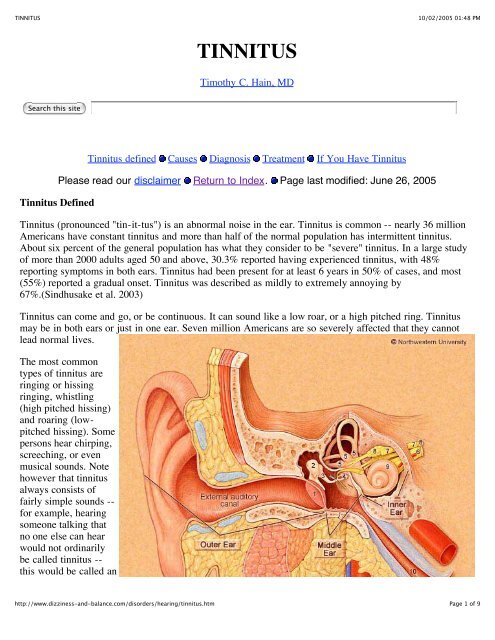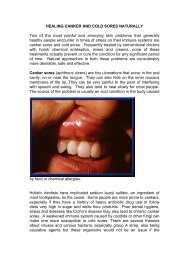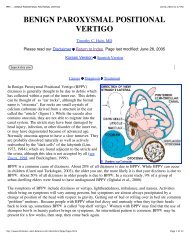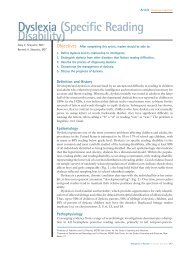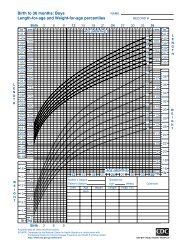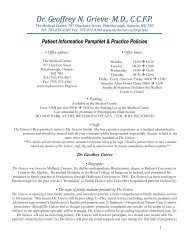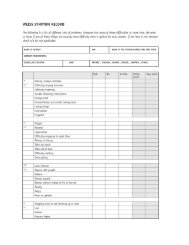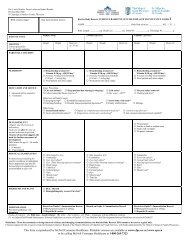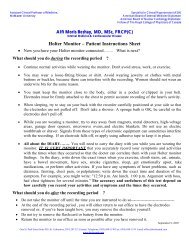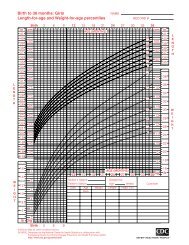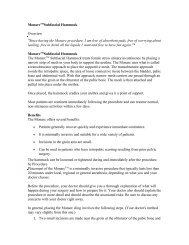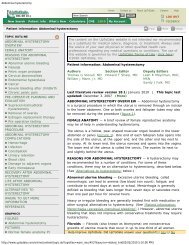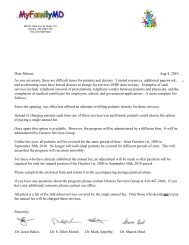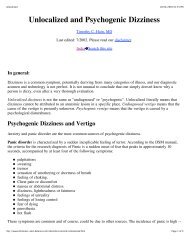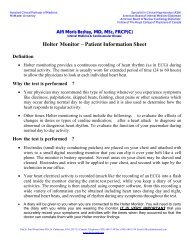TINNITUS - Mydoctor.ca
TINNITUS - Mydoctor.ca
TINNITUS - Mydoctor.ca
You also want an ePaper? Increase the reach of your titles
YUMPU automatically turns print PDFs into web optimized ePapers that Google loves.
<strong>TINNITUS</strong><br />
10/02/2005 01:48 PM<br />
<strong>TINNITUS</strong><br />
Timothy C. Hain, MD<br />
Search this site<br />
Tinnitus Defined<br />
Tinnitus defined Causes Diagnosis Treatment If You Have Tinnitus<br />
Please read our disclaimer Return to Index. Page last modified: June 26, 2005<br />
Tinnitus (pronounced "tin-it-tus") is an abnormal noise in the ear. Tinnitus is common -- nearly 36 million<br />
Ameri<strong>ca</strong>ns have constant tinnitus and more than half of the normal population has intermittent tinnitus.<br />
About six percent of the general population has what they consider to be "severe" tinnitus. In a large study<br />
of more than 2000 adults aged 50 and above, 30.3% reported having experienced tinnitus, with 48%<br />
reporting symptoms in both ears. Tinnitus had been present for at least 6 years in 50% of <strong>ca</strong>ses, and most<br />
(55%) reported a gradual onset. Tinnitus was described as mildly to extremely annoying by<br />
67%.(Sindhusake et al. 2003)<br />
Tinnitus <strong>ca</strong>n come and go, or be continuous. It <strong>ca</strong>n sound like a low roar, or a high pitched ring. Tinnitus<br />
may be in both ears or just in one ear. Seven million Ameri<strong>ca</strong>ns are so severely affected that they <strong>ca</strong>nnot<br />
lead normal lives.<br />
The most common<br />
types of tinnitus are<br />
ringing or hissing<br />
ringing, whistling<br />
(high pitched hissing)<br />
and roaring (lowpitched<br />
hissing). Some<br />
persons hear chirping,<br />
screeching, or even<br />
musi<strong>ca</strong>l sounds. Note<br />
however that tinnitus<br />
always consists of<br />
fairly simple sounds --<br />
for example, hearing<br />
someone talking that<br />
no one else <strong>ca</strong>n hear<br />
would not ordinarily<br />
be <strong>ca</strong>lled tinnitus --<br />
this would be <strong>ca</strong>lled an<br />
http://www.dizziness-and-balance.com/disorders/hearing/tinnitus.htm<br />
Page 1 of 9
<strong>TINNITUS</strong><br />
10/02/2005 01:48 PM<br />
auditory hallucination.<br />
Tinnitus is commonly<br />
accompanied by<br />
hearing loss. Less<br />
commonly, it may be<br />
accompanied by<br />
hyperacusis (an<br />
abnormal sensitivity to sound).<br />
Pulsatile tinnitus: people hear something resembling their heartbeat in their ear. The <strong>ca</strong>use usually involves<br />
vascular, tumor or muscular <strong>ca</strong>uses. A blood vessel may be close to the eardrum, a vascular tumor such as a<br />
"glomus" may fill the middle ear, or a vein similar to a varicose vein may make enough noise to be heard.<br />
Other possibilities include dehiscence of the jugular bulb, and an aberrantly lo<strong>ca</strong>ted <strong>ca</strong>rotid artery. An<br />
enlarged jugular bulb on the involved side is common in persons with venous type pulsitile tinintus.<br />
What Causes Tinnitus? Most tinnitus comes from damage to the inner ear, specifi<strong>ca</strong>lly the cochlea (the<br />
snail like thing on the right labelled '9'). Tinnitus <strong>ca</strong>n also arise from damage to the nerve between the ear<br />
and brain (8th nerve, labeled 6, auditory nerve), much more rarely from injury to the brainstem (Lanska et<br />
al, 1987), and extremely rarely, to the brain itself. There are specific <strong>ca</strong>uses. Ear wax <strong>ca</strong>n rarely <strong>ca</strong>use<br />
tinnitus. Other <strong>ca</strong>uses include middle ear infection or fluid, Meniere's disease, microvascular compression<br />
syndrome, otosclerosis, and infections such as otosyphilis or labyrinthitis, and tumors of the 8th nerve.<br />
There are small muscles in the middle ear (the tensor tympani and stapedius) that <strong>ca</strong>n start twitching and<br />
<strong>ca</strong>use tinnitus (Golz et al. 2003).<br />
Patients with head or neck injury may have particularly loud and disturbing tinnitus (Folmer and Griest,<br />
2003).<br />
Patients with Meniere's disease often describe a low pitched tinnitus resembling a hiss or a roar. Pulsatile<br />
tinnitus (tinnitus that beats with your pulse) <strong>ca</strong>n be <strong>ca</strong>used by aneurysms, increased pressure in the head<br />
(hydrocephalus), and hardening of the arteries. Anything that increases blood flow or turbulence such as<br />
hyperthyroidism, low blood viscosity (e.g. anemia), or tortuous blood vessels may <strong>ca</strong>use pulstitle tinnitus.<br />
Vitamin B12 deficiency is common in tinnitus patients.<br />
Loud noise is the leading <strong>ca</strong>use of damage to the inner ear. Most patients with noise trauma describe a<br />
whistling tinnitus (Nicholas-Puel et al,. 2002). In a large study of tinnitus, avoidance of occupational noise<br />
was one of two factors most important in preventing tinnitis (Sindhusake et al. 2003). The other important<br />
factor was the rapidity of treating ear infections.<br />
Advancing age is often accompanied by inner ear damage and tinnitus. (Sindhusake et al. 2003)<br />
Many medi<strong>ca</strong>tions also <strong>ca</strong>n <strong>ca</strong>use tinnitus (see list below). Generally this is thought to arise from their effect<br />
on the cochlea (inner ear).<br />
Drugs that commonly <strong>ca</strong>use or increase tinnitus -- these are largely ototoxins.<br />
NSAIDS (motrin, naproxen, relafen, etc)<br />
aspirin and other salicylates<br />
http://www.dizziness-and-balance.com/disorders/hearing/tinnitus.htm<br />
Page 2 of 9
<strong>TINNITUS</strong><br />
10/02/2005 01:48 PM<br />
Lasix and other "loop" diuretics<br />
"mycin" antibiotics such as vancomycin (but rarely macrolides such as azithromycin)<br />
quinine and related drugs<br />
Chemotherapy such as cis-platin<br />
How is Tinnitus Diagnosed ? Persons with tinnitus should be seen by a physician expert in ear disease,<br />
usually an otologist or a neurotologist. There should be an examination of the ears, hearing should be tested<br />
with a tympanometer, and a long recording of ear drum compliance should be made with a tympanometer (a<br />
screener won't work here). The audiogram sometimes shows a sensorineural deficit due to masking from the<br />
tinnitus. Tympanograms <strong>ca</strong>n sometimes show a rhythmic compliance change due to a middle ear vascular<br />
mass or due to contraction of muscles in the middle ear. An ABR test may be helpful in diagnosing tinnitus<br />
due to a tumor of the 8th nerve or tinnitus due to a central process.<br />
Inspection of the eardrum may sometimes demonstrate subtle movements due to contraction of the tensor<br />
tympani (Cohen and Perez, 2003). Myoclonus <strong>ca</strong>uses a thumping sound.<br />
Stapedius and Tensor Tympani Muscles<br />
With permission, from: http://www.meddean.luc.edu/lumen/meded/grossanatomy/dissector/mml/images/stap.jpg<br />
Myoclonus of the stapedius often results in visible contractions of the ear drum, which produce sounds<br />
http://www.dizziness-and-balance.com/disorders/hearing/tinnitus.htm<br />
Page 3 of 9
<strong>TINNITUS</strong><br />
10/02/2005 01:48 PM<br />
audible to the examiner. An impedance bridge (tympanometer) <strong>ca</strong>n document rhythmic changes in ear drum<br />
compliance. There should not be movement of the palate in the stapedius myoclonus syndrome (as this<br />
would suggest palatal myoclonus).<br />
The eyes should be examined for papilloedema (swelling of a portion of the back of the eye <strong>ca</strong>lled the<br />
"optic disk") as increased intracerebral pressure <strong>ca</strong>n <strong>ca</strong>use tinnitus.<br />
The TMJ joints of the jaw should be checked as about 28% of persons with TMJ syndrome experience<br />
tinnitus. The physician may also request a BAER test (clicks in ears), an ECOG, an MRI/MRA test (s<strong>ca</strong>n of<br />
the brain), and several blood tests (ANA, B12, FTA, ESR, SMA-24, HBA-IC, fasting glucose, TSH, antimicrosomal<br />
antibodies).<br />
In persons with pulsatile tinnitus, additional tests maybe proposed to study the blood vessels and to check<br />
the pressure inside the head. Gentle pressure on the neck <strong>ca</strong>n be performed to block the jugular vein but not<br />
the <strong>ca</strong>rotid artery. The Valsalva maneuver reduces venous return by increasing intrathoracic pressure. If<br />
there is a venous hum, this usually abates or improves markedly. If the pulsation is arterial, these tests have<br />
no effects. MRI/MRA or CT is often suggested in younger patients with unilateral pulsatile tinnitus. In older<br />
patients, pulsatile tinnitus is often due to atherosclerotic disease and it is less important to get an<br />
MRI/MRA. A lumbar puncture may be considered if there is a possibility of benign intracranial<br />
hypertension. More invasive testing includes the "balloon occlusion test", where a balloon is blown up in the<br />
internal jugular vein to see if it eliminates tinnitus.<br />
Vestibular tests such as ENG or posturography are generally not helpful in diagnosing tinnitus. Tinnitus is<br />
rarely attributable to sinus disease and even if tests suggest that you have this common condition, it is<br />
unlikely that treatment of it will affect tinnitus.<br />
Based on these tests, tinnitus <strong>ca</strong>n be separated into <strong>ca</strong>tegories of cochlear, retrocochlear, central, and tinnitus<br />
of unknown <strong>ca</strong>use.<br />
How Is Tinnitus Treated ?<br />
The bad news: Dobie (1999) reviewed the 69 randomized controlled trials of tinnitus treatments. According<br />
to Dr. Dobie, no treatment <strong>ca</strong>n yet be considered "well established" in terms of providing repli<strong>ca</strong>ble longterm<br />
reduction of tinnitus impact, in excess of placebo effects. Support and counseling are probably helpful<br />
as are tricyclic antidepressants in severe <strong>ca</strong>ses. Benzodiazepines, newer antidepressants and electri<strong>ca</strong>l<br />
stimulation deserve further study. But don't lose all hope: Dobie made the point that tinnitus is likely<br />
multifactorial, and the usual study design is likely not well chosen for this situation. A study design where<br />
initially an open-label study is performed, followed by a randomized placebo controlled trial might find<br />
patient groups that respond to a medi<strong>ca</strong>tion. This seems very logi<strong>ca</strong>l.<br />
If a specific <strong>ca</strong>use for tinnitus is found, then your doctor may be able to eliminate the noise. Examples of<br />
specific <strong>ca</strong>uses include medi<strong>ca</strong>tion, tumors, infections, Ménière's disease, TMJ and otosclerosis. Tinnitus<br />
due to the tensor tympani <strong>ca</strong>n be treated by transection of that muscle. To find a specific <strong>ca</strong>use it may<br />
require a fairly extensive workup including X-rays and blood tests. However, even after extensive workup,<br />
most <strong>ca</strong>uses of tinnitus go undiagnosed.<br />
If a specific <strong>ca</strong>use of tinnitus is not found, it is unlikely that the tinnitus <strong>ca</strong>n be gotten rid of. At best, one<br />
might get partial relief from some of the strategies to be described in the next few paragraphs. However,<br />
http://www.dizziness-and-balance.com/disorders/hearing/tinnitus.htm<br />
Page 4 of 9
<strong>TINNITUS</strong><br />
10/02/2005 01:48 PM<br />
even though treatment may not be available, tinnitus should be checked into, as tinnitus may be a warning<br />
sign of a serious disorder such as a tumor of the 8th nerve, or other disorder which may impair hearing.<br />
Tinnitus does tend to gradually get better, but many persons with severe tinnitus still experience distress 5<br />
years later. Tolerance of tinnitus increases with time. (Andersson et al, 2001).<br />
Medicines<br />
may oc<strong>ca</strong>sionally help lessen the noise even though no <strong>ca</strong>use <strong>ca</strong>n be found. In general, we are not at all<br />
enthused about medi<strong>ca</strong>tion treatment as the side effects <strong>ca</strong>n be substantial and the results are often<br />
unimpressive. In randomized clini<strong>ca</strong>l trials, for the most part, the agents under study have failed to<br />
demonstrate elimination of tinnitus more frequently than have placebos (Dobie RA, 1999). Medi<strong>ca</strong>tions to<br />
deal with the psychologi<strong>ca</strong>l fallout of tinnitus is often useful -- antidepressants and anti-anxiety medi<strong>ca</strong>tions<br />
<strong>ca</strong>n be very helpful.<br />
Medi<strong>ca</strong>tions used in treatment of Tinnitus<br />
Lorazepam or klonazepam (in low doses). These are "benzodiazepines" (Ganan<strong>ca</strong> et al, 2002; Dobie,<br />
2003)<br />
Amitriptyline or nortriptyline (again in low doses). These are "tricyclics".<br />
cyclandelate (Cyclospasmol) -- a vasodilator that slightly reduced tinnitus (Dobie, 1999)<br />
Mysoline or oxbamazepine in doses used for epilepsy<br />
Comment. Benzodiazepines and tricyclics probably mainly change emotional responses to tinnitus. Any<br />
sort of relief, however, is important. We have also had some patients get relief from other antidepressants<br />
including the SSRI family. The anticonvulsants such as mysoline may affect some patients who have<br />
tinnitus due to 8th nerve irritation. The effect of lo<strong>ca</strong>l anesthetics on tinnitus was discovered serendipitously<br />
by Barany in 1935. Otsuka et al (2003) recently reported administration of Lido<strong>ca</strong>ine to 117 ears over a 24<br />
year period. The method was intravenous infusion, of between 80 and 100 mg. They report a transient<br />
(several minutes) response in about 70% of treated ears. As responses are nearly always very temporary,<br />
lido<strong>ca</strong>ine does not have a role as a treatment of tinnitus. The mechanism appears to be central (Baguley et<br />
al, 2005). According to Dobie (1999), the related drugs to<strong>ca</strong>inamide, mexilitine and fle<strong>ca</strong>inamide have not<br />
been shown superior to placebo.<br />
Drugs in which it is uncertain whether they are effective<br />
Flunarizine (not available in US)<br />
Caroverine (not available in US, IV medi<strong>ca</strong>tion)<br />
Eperisone (not available in US).<br />
Drugs that are probably placebos for tinnitus (see additional comments at the beginning of the<br />
treatment section)<br />
Baclofen -- rarely helpful, has signifi<strong>ca</strong>nt side effects.<br />
B12 (1000 ug per week).<br />
<strong>ca</strong>rbamazepine (Tegretol) -- an anticonvulsant. (Dobie RA, 1999)<br />
cinnarizine (Dobie, 1999)<br />
Dexamethoasone (Intratympanic) (Araujo et al, 2005)<br />
http://www.dizziness-and-balance.com/disorders/hearing/tinnitus.htm<br />
Page 5 of 9
<strong>TINNITUS</strong><br />
10/02/2005 01:48 PM<br />
Ginkgo Biloba (Alternative medicine found in health food stores, 120-240 mg twice daily -- some<br />
anecdotal evidence of effi<strong>ca</strong>cy) (Seidman and Keate, 2002)<br />
lamotrigine (an anticonvulsant)<br />
misoprostol, Cytotec (300 mg TID) -- we have never encountered a patient that responded to this<br />
Serc (8mg TID) -- for Meniere's disease. Also other medi<strong>ca</strong>l treatments of Meniere's disease may be<br />
worth considering.<br />
To<strong>ca</strong>inamide (more than 1200 mg/day) -- a <strong>ca</strong>rdiac drug related to the lo<strong>ca</strong>l anesthetics (Dobie, 1999)<br />
Zinc supplements (50 mg daily)<br />
Comment: Some of these drugs may be worth considering depending on ones personal situation. The ones<br />
with the least adverse effects would seem most logi<strong>ca</strong>l.<br />
Surgi<strong>ca</strong>l treatment of tinnitus:<br />
Surgery is rarely indi<strong>ca</strong>ted for tinnitus. It should be considered when there is a clear structural reason for<br />
tinnitus that <strong>ca</strong>n be improved with surgery. Examples include Meniere's disease, microvascular compression<br />
syndrome surgery, shunt surgery for hydrocephalus, closure of a dural sinus fistula. Rarely 8th nerve<br />
sections are done for tinnitus. They are successful in about 50%, with the price of losing hearing in 100%.<br />
What to do if you have tinnitus ?<br />
1.<br />
Avoid exposure to loud noises and sounds.<br />
2.<br />
Aim for a low-normal intake of salt.<br />
3.<br />
Avoid stimulants such as <strong>ca</strong>ffeine and nicotine.<br />
4.<br />
Exercise daily, get adequate rest, and avoid fatigue.<br />
5.<br />
Avoid ototoxic medi<strong>ca</strong>tions known to increase tinnitus such as aspirin, non-steroidals and quinine<br />
containing preparations.<br />
Diet: We recommend that persons with tinnitus limit salt (no added salt), and refrain from drinking<br />
<strong>ca</strong>ffeinated beverages, other stimulants (like tea), and chocolate. The salt restriction is intended for those<br />
who might have a subclini<strong>ca</strong>l form of Meniere's. Caffeine and similar substances increase tinnitus in a<br />
nonspecific fashion. Otherwise the diet should be balanced and have normal amounts of fruits and<br />
vegetables.<br />
Hearing aids and other devices <strong>ca</strong>lled "maskers" may also help alleviate tinnitus. This is a tricky business.<br />
If you have tinnitus associated with a hearing loss, a hearing aid is a reasonable thing to try. Be sure that you<br />
try the hearing aid before buying one, as tinnitus is not always helped by an aid. Nearly all states mandate a<br />
1-month money-back guarantee built into hearing aid dispensing. It also seems possible that a hearing aid<br />
might exacerbate tinnitus, as many people develop "ringing" of their ears after exposure to loud noise.<br />
Maskers are based on the idea that tinnitus is usually worst when things are very quiet. Listening to the<br />
interstation static on the FM radio, tapes of ocean surf, fans, and the like may be helpful. Pillow speakers<br />
sold by Radio Shack may be helpful in order to avoid disturbing others. Tinnitus maskers are fitted and sold<br />
by audiologists. Controlled studies of maskers have shown some small effects (Dobie, 1999).<br />
Alternative medicine approaches. Ginkgo-Biloba, betahistine (Serc), Zinc, and acupuncture are sometimes<br />
advo<strong>ca</strong>ted as treatment for intractable tinnitus. There is little evidence that these agents work, but they also<br />
http://www.dizziness-and-balance.com/disorders/hearing/tinnitus.htm<br />
Page 6 of 9
<strong>TINNITUS</strong><br />
10/02/2005 01:48 PM<br />
do not seem to be harmful. More discussion about alternative medi<strong>ca</strong>tions is available here.<br />
Psychologi<strong>ca</strong>l help: Often, anxiety or depression which accompanies tinnitus may be as big a problem as<br />
the tinnitus itself. In this instance, consultation with a psychologist or psychiatrist expert in this field may be<br />
helpful. Hypnosis may be effective and increase tolerance to tinnitus, but randomized controlled trials are<br />
not encouraging (Dobie, 1999). If you <strong>ca</strong>n ignore tinnitus rather than obsess about it, this may be the best<br />
way to handle it. Medi<strong>ca</strong>tions that help people with obsessive compulsive disorder (such as the SSRI family)<br />
may be helpful.<br />
Self Help: You might consider joining the Ameri<strong>ca</strong>n Tinnitus Association. (PO Box 5, Portland, OR 97207,<br />
503-248-9985). However, if your tinnitus has been well "worked up", and there is nothing more to be done,<br />
it might be best to attempt to ignore it rather than focus more attention on it.<br />
Tinnitus Retraining Therapy (TRT). This method of habituation of tinnitus is helpful for some (Wang et<br />
al, 2003). It requires a considerable commitment of time.<br />
Dubious, non-drug treatments<br />
Acupuncture. This probably another placebo treatment although acupuncture is preferred to placebo (Dobie,<br />
1999)<br />
Electri<strong>ca</strong>l stimulation. Two randomized controlled trials in the 1980's found a device ineffective compared<br />
with a placebo (Dobie, 1999). There is probably no harm other than to the pocketbook.<br />
Electromagnetic stimulation. Again, no help. (Ghossaini et al, 2004).<br />
Magnetic Stimulation: Of course, magnetic head-bands or the like are almost certainly placebos. Little data<br />
is available (Dobie, 1999)<br />
Surgery: Unlike some of the other treatments discussed here, surgery is not necessarily a placebo.<br />
Nevertheless, only rarely is surgi<strong>ca</strong>l treatment indi<strong>ca</strong>ted, and even more rarely, is tinnitus relieved by<br />
surgery. You should certainly consider surgery if your tinnitus is due to a tumor and also if it is due to a<br />
venous source (usually pulsatile in this situation). For venous tinnitus, possibilities include jugular vein<br />
ligation, occlusion of the sigmoid sinus, or closure of a dural fistula. Surgery may also be an option to<br />
consider if your diagnosis is otosclerosis, fistula or Ménière's disease. Oc<strong>ca</strong>sionally persons with Meniere's<br />
disease have relief or reduction of tinnitus from transtympanic gentamicin. Microvascular compression<br />
syndrome, in theory, may <strong>ca</strong>use tinnitus, but we have had very little success when the few patients we have<br />
seen with this syndrome have undergone surgery.<br />
Ultrasound: No difference from placebo (Dobie, 1999)<br />
Zinc. Zinc has been used for many years as a treatment of tinnitus. Most studies show no signifi<strong>ca</strong>nt effect<br />
(e.g. Arda et al, 2003). It seems most likely at this writing (2003) that Zinc is a placebo.<br />
http://www.dizziness-and-balance.com/disorders/hearing/tinnitus.htm<br />
Page 7 of 9
<strong>TINNITUS</strong><br />
10/02/2005 01:48 PM<br />
Research Studies in Tinnitus<br />
As of 4/2002, a visit to the National Library of Medicine's search engine, Pubmed, revealed more than 3,900<br />
research articles concerning tinnitus published since 1966. In spite of this gigantic effort, very little is<br />
presently known about tinnitus, and often effective treatment is unavailable.<br />
links to other tinnitus materials:<br />
Tinnitus poetry<br />
References:<br />
Andersson G, Vretblad P, Larsen H, Lyttkens L. Longitudinal follow-up of tinnitus complaints. Arch<br />
Oto HNS 2001:127:175-179<br />
Araujo MF and others. Intratympanic dexamethasone injection as a treatment for severe disabling<br />
tinnitus. Arch Otol HNS 2005:131:113-117.<br />
Bagulel DM and others. The inhibitory effect of intravenous lido<strong>ca</strong>ine ... Otology & Neurotology,<br />
26:169-176, 2005<br />
H. Nedim Arda; Umit Tuncel; Ozgur Akdogan; Levent N. Ozluoglu. The Role of Zinc in the<br />
Treatment of Tinnitus. Otology & Neurotology 2003; 24(1):86-89<br />
Cohen D, Perez R. Bilateral myoclonus of the tensor tympani: A <strong>ca</strong>se report. Otolaryngol HNS<br />
2003:128:441<br />
Dobie RA. A review of randomized clini<strong>ca</strong>l trials in tinnitus. Laryngoscope 1999;109(8):1202-11.<br />
Folmer RL, Griest SE. Chronic tinnitus resulting from head or neck injuries. Laryngoscope 2003<br />
May;113(5):821-7<br />
Gana<strong>ca</strong> MM et al. Clonazepam in the pharmacologi<strong>ca</strong>l treatment of vertigo and tinnitus.<br />
International Tinnitus Journal, 8, 1,50-53 (2002)<br />
GHOSSAINI SN, Spitzer JB, Mackins CC, Zschommler A, et al. High-frequency pulsed<br />
electromagnetic energy in tinnitus treatment. Laryngoscope 2004;114:495-500.<br />
Golz A, Fradis M, Martzu D, Netzer A and Joachims HZ (2003). "Stapedius muscle myoclonus." Ann<br />
Otol Rhinol Laryngol 112(6): 522-4.<br />
Gristwood RE, Venables WN Otosclerosis and chronic tinnitus. Ann Otol Rhinol Laryngol 2003<br />
May;112(5):398-403<br />
Lanska Dj, Lanska MJ, Mendez MF. Brainstem auditory hallucinosis. Neurology 1987, 37, 1685<br />
Hesse G, Schaaf H. [Ginkgo biloba: ineffective against tinnitus?] HNO 2001; 49: 434-6.<br />
Nicholas-Puel C and others. Characteristics of tinnitus and etiology of associated hearing loss: A<br />
study of 123 patients. Int. Tinnitus J, 8, 1,, 37-44, 2002<br />
Otsuka K, Pulec J, Suzuki M. Assessment of intravenous lido<strong>ca</strong>ine for the treatment of subjective<br />
tinnitus. ENT journal, 82, 10, 781-, 2003<br />
Plewnia C, Bartels M, Gerloff C. Transient suppression of tinnitus by transcranial magnetic<br />
stimulation. Ann Neurol 2003:53;263-266<br />
Seidman. RE and Keate B.:Letter to the editor -- Myths in neurotology, revisited: smoke and mirrors<br />
in tinnitus therapy. Otol Neurotol 23:1013-1016, 2002<br />
Shea JJ Jr, Ge X. Lido<strong>ca</strong>ine perfusion of the inner ear plus IV Lido<strong>ca</strong>ine for intractable tinnitus<br />
http://www.dizziness-and-balance.com/disorders/hearing/tinnitus.htm<br />
Page 8 of 9
<strong>TINNITUS</strong><br />
10/02/2005 01:48 PM<br />
(abstract). Available at: http://www.sheaclinicinc.com/HTML/abstract.html. May,2000<br />
Sindhusake D, Golding M, Newall P, Rubin G, Jakobsen K and Mitchell P (2003). "Risk factors for<br />
tinnitus in a population of older adults: the blue mountains hearing study." Ear Hear 24(6): 501-7.<br />
Sindhusake D, Mitchell P, Newall P, Golding M, Rochtchina E and Rubin G (2003). "Prevalence and<br />
characteristics of tinnitus in older adults: the Blue Mountains Hearing Study." Int J Audiol 42(5): 289-<br />
94.<br />
Wang H, Jiang S, Yang W, Han D. Tinnitus retraining therapy: a clini<strong>ca</strong>l control study of 117<br />
patients.Zhonghua Yi Xue Za Zhi 2002 Nov 10;82(21):1464-7<br />
http://www.dizziness-and-balance.com/disorders/hearing/tinnitus.htm<br />
Page 9 of 9


